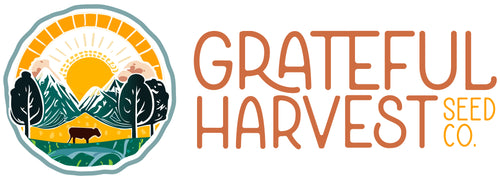There is a lot of confusion relating to seeds. We hope these simplified definitions will help.
Heirloom - This means an older variety with stabilized genes that grows true to seed, that means that if cross pollination is prevented, the seeds saved from these varieties will be the same as the parent plants generation after generation after generation. So how old? That depends on who you ask. Sometimes it's over 100 years, sometimes over 50, sometimes less. For us, the most important things are that it is stable and that people liked it enough to pass it along to posterity.
Open Pollinated - This is really similar to heirloom in that the variety has been stabilized and characteristics will be retained generation to generation. What's missing is the arbitrary line in the sand that says it's old. You could think of these as future heirlooms if you really wanted to and we wouldn't even make fun of you for it.
Hybrid - The result of traditional plant breeding. Most hybrids are the result of crossing two different varieties of the same kind of plant, like two varieties of peppers. A hybrid is not bad, nor does it mean that it has been genetically modified. In fact, some hybrids are better than their parents as they can have traits like better disease resistance. There's about a 99% chance that every, single heirloom variety is in fact a hybrid, albeit a stabilized one. The most important thing to remember about hybrids is that saving seeds from these will mean that the plants grown from those seeds won't be the same year to year. They will be genetic wild cards that exhibit many different traits from their parents. creating and stabilizing hybrids is how new varieties are made and it can be quite rewarding if you like surprises. We sell virtually no hybrids at this time.
GMO - Genetically Modified Organism. This happens when someone in a lab changes the genes of something, often times by removing certain genes, replacing them, or inserting genetic material from a completely different kind of organism, like inserting a particular bacteria (an organism of its own) into corn to make it tolerate being sprayed by herbicides. Or adding DNA from a fish into a tomato. We feel it is a corruption of God's design and a bad idea with unknown consequences. Therefore, we do not sell any GMO seeds. By and large, GMO seeds are not available to home gardeners. It's important to note, hybrid varieties created through traditional plant breeding methods (like intentional cross-pollination) are not GMOs. See "hybrid" above if you are still confused or skipped over it.
Non-GMO - Um.... Not genetically modified. Maybe this is most applicable to food and food substances, but keep in mind "non-GMO" says nothing about growing and farming practices. Non-GMO does not mean organic. Growers are still able to use herbicides, pesticides, fungicides, and all manner of chemicals when growing these. It simply means that there has not been modification or insertion of genetic material. Traditional plant breeding methods which create hybrids do not count as GMO.
